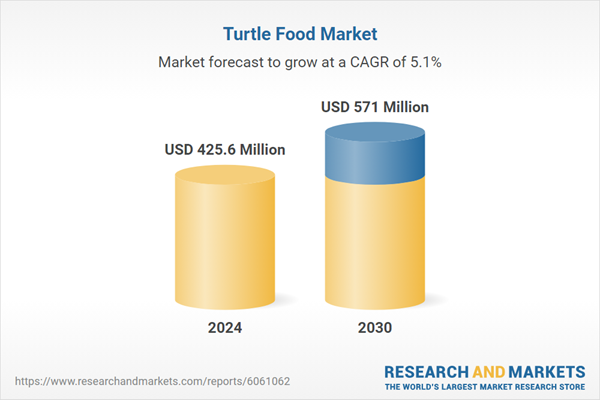Speak directly to the analyst to clarify any post sales queries you may have.
10% Free customizationThis report comes with 10% free customization, enabling you to add data that meets your specific business needs.
Market Drivers
Rising Pet Turtle Ownership
One of the primary drivers for the growth of the turtle food market is the rising ownership of pet turtles. As more individuals seek exotic pets, turtles have gained popularity due to their low-maintenance nature compared to other pets like dogs and cats. The growing trend of owning turtles, especially among young adults and families, has led to an increased demand for products designed specifically for their care. This includes specialized turtle food that caters to the nutritional needs of different species, such as aquatic turtles, land turtles, and box turtles.As turtle owners seek to provide a balanced and healthy diet for their pets, there is an expanding market for quality turtle food, including pellets, fresh vegetables, and protein-rich options. The popularity of online pet food stores and the increasing availability of a variety of turtle food products have further fueled this growth. Pet owners are now more informed and conscious of their turtles' dietary requirements, opting for food that is not only nutritious but also aligned with their specific species' needs. This trend reflects broader shifts in consumer behavior, with pet owners increasingly prioritizing the health and well-being of their pets. The increase in pet turtle ownership is supported by the growing interest in sustainable and eco-friendly lifestyles, where individuals choose pets that require less space and fewer resources.
Key Market Challenges
Lack of Standardization and Regulation
One of the major challenges facing the Turtle Food Market is the lack of standardization and regulation of turtle food products. Unlike other pet foods, such as dog or cat food, there are fewer strict regulations and guidelines governing the formulation and labeling of turtle food. This inconsistency can lead to discrepancies in product quality and nutritional value across different brands, making it difficult for consumers to make informed decisions when choosing the right food for their turtles. Many turtle food products, especially those available in the lower-price range, may contain poor-quality ingredients that fail to meet the nutritional requirements of turtles. Additionally, some products may contain harmful preservatives, additives, or artificial colors that could negatively impact the health of the turtles. The absence of clear regulatory frameworks often means that manufacturers can produce substandard products that do not adhere to the best nutritional practices for turtles, leading to potential health risks for pets.Key Market Trends
Shift Toward Natural and Organic Ingredients
One of the prominent trends in the Turtle Food Market is the growing demand for natural and organic ingredients in turtle food products. As consumers become more health-conscious and environmentally aware, there is an increasing preference for foods that are free from artificial additives, preservatives, and chemicals. This trend is not just limited to human food; it is extending into the pet food industry, including for reptiles like turtles. Consumers are now seeking out turtle food that is made from high-quality, natural ingredients, such as whole fish, leafy greens, and natural supplements, which are closer to a turtle's natural diet.The increasing awareness of sustainability and eco-friendliness also plays a significant role in this trend. Organic ingredients are often produced with fewer pesticides and synthetic fertilizers, which appeal to eco-conscious consumers. Additionally, the focus on natural ingredients aligns with the rising preference for cruelty-free products, as consumers seek brands that align with their values of animal welfare and environmental preservation. For manufacturers, this trend offers an opportunity to innovate by developing new product lines with organic and sustainably sourced ingredients. Brands can differentiate themselves by offering all-natural, non-GMO, and organic turtle food options.
Key Market Players
- Zoo Med Laboratories, Inc.
- Tetra (Spectrum Brands Pet, LLC)
- Exo Terra (RC Hagen Inc.)
- Fluker's Cricket Farm, Inc.
- Zilla (Central Garden & Pet Company)
- Mazuri (Land O'Lakes, Inc.)
- Repashy Ventures Inc.
- Nature Zone Pet Products
- Sera GmbH
- Aquatic Foods Inc.
Report Scope:
In this report, the global Turtle Food Market has been segmented into the following categories, in addition to the industry trends which have also been detailed below:Turtle Food Market, By Product Type:
- Sticks
- Chunks
- Pellets
Turtle Food Market, By Category:
- Vegetarian Food
- Non-vegetarian Food
Turtle Food Market, By Distribution Channel:
- Online
- Offline
Turtle Food Market, By Region:
- North America
- United States
- Canada
- Mexico
- Europe
- France
- Germany
- Spain
- Italy
- United Kingdom
- Asia-Pacific
- China
- Japan
- India
- Vietnam
- South Korea
- Middle East & Africa
- South Africa
- Saudi Arabia
- UAE
- Turkey
- Kuwait
- Egypt
- South America
- Brazil
- Argentina
- Colombia
Competitive Landscape
Company Profiles: Detailed analysis of the major companies present in the global Turtle Food Market.Available Customizations:
With the given market data, the publisher offers customizations according to a company's specific needs. The following customization options are available for the report.Company Information
- Detailed analysis and profiling of additional market players (up to five).
This product will be delivered within 1-3 business days.
Table of Contents
Companies Mentioned
- Zoo Med Laboratories, Inc.
- Tetra (Spectrum Brands Pet, LLC)
- Exo Terra (RC Hagen Inc.)
- Fluker's Cricket Farm, Inc.
- Zilla (Central Garden & Pet Company)
- Mazuri (Land O'Lakes, Inc.)
- Repashy Ventures Inc.
- Nature Zone Pet Products
- Sera GmbH
- Aquatic Foods Inc.
Table Information
| Report Attribute | Details |
|---|---|
| No. of Pages | 184 |
| Published | March 2025 |
| Forecast Period | 2024 - 2030 |
| Estimated Market Value ( USD | $ 425.6 Million |
| Forecasted Market Value ( USD | $ 571 Million |
| Compound Annual Growth Rate | 5.1% |
| Regions Covered | Global |
| No. of Companies Mentioned | 10 |









